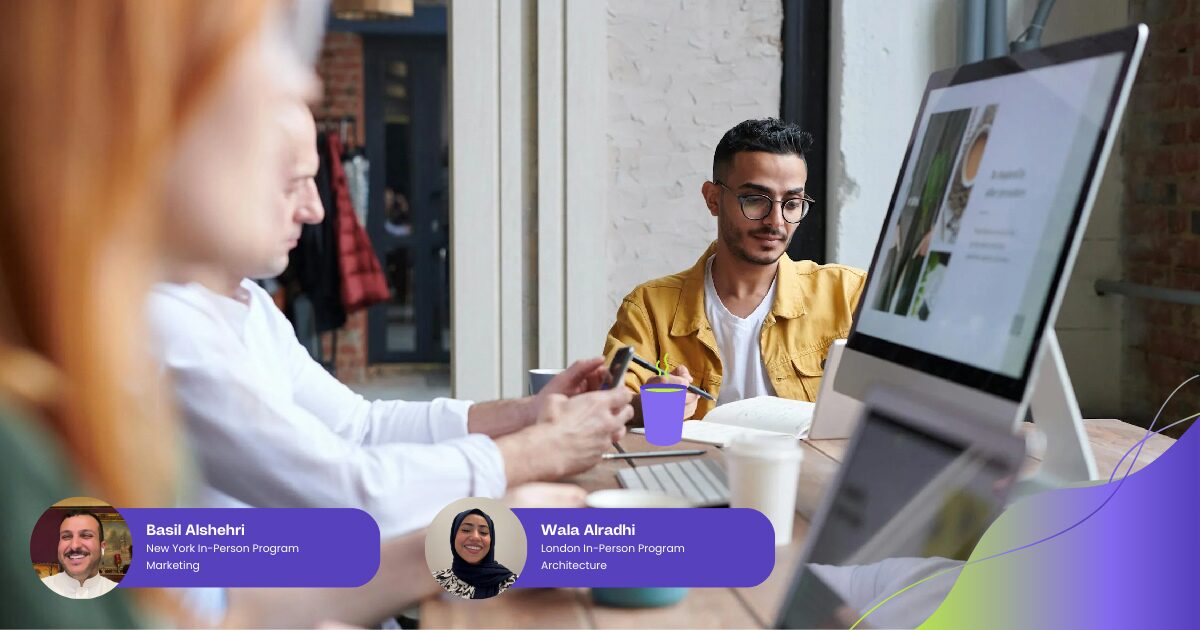
The importance of global opportunities for career growth and personal development can’t be understated. It exposes you to new environments, helps you become independent and boosts your career. The issue is not with the opportunity, it’s with the sheer amount of work that goes into getting one. A weekend away from home takes days to plan. Meanwhile, interning abroad for several weeks—or even months—is much more complex.
Two of our past interns, Basil Alshehri and Wala Alradhi, share their personal experiences interning abroad—and the unexpected truths they learnt on the journey.
The big switch when interning abroad
When vying for an internship abroad, there’s a whole list of considerations you need to go through first. You’ll need to settle on a few viable locations, shortlist employers, apply for an internship and get an offer first. After this comes the the heavier visa planning process, finding accommodation, and putting together a stack of documents. We try to elevate as much of this burden off the candidates as possible—which is why most internship programs exist.
Basil and Wala, our former interns from our 2023 New York and London in-person programs, had their own adventures on their path to their internship.
Wala, an up-and-coming architect, graduated in June 2022 prior to making the decision to take on an internship in the UK. “My course was quite challenging—everything is involved, as a designer, as an architect—all in one course. It’s mostly a self-taught course where I did everything by myself. I didn’t know how I would handle working in a team with senior architects who have more experience.
“I thought it was going to be really harder than what I’ve been through, to be honest. I’m happy that I did my course, and I studied in the UK, so I had a similar system. They prepared us for how things work in practice, in terms of the stages … I don’t have a master’s degree, so my experience is just too little compared to people who have one or who’re qualified as architects or have part two in architecture.”
When it was time for find an internship, Wala set her eyes on London.
“I was like, there are so many opportunities (to intern) there. Let me just go ahead with this, apply and see how things go. I studied in Manchester and it’s a smaller city. So, you always want to evaluate and jump from a bigger experience, a bigger environment. That was an option for me and I’m glad that I did that.”
You do miss 100% of the shots you don’t take, so we’re incredibly glad Wala went ahead with it, too.
Going on to describe the switch in pace, she explained, “London is a fast-forward city. Manchester is an intimate school. People are friendlier, fewer tourists. It has homey vibes but London welcomes everyone, to be honest. Tourists, younger people like me, students, people from all around the world—it’s quite different.”
Transportation woes
Basil, on the other hand, hoped to intern in the US prior to heading back home to Saudi Arabia. He got his wish when he received an offer to intern with Endeavor in New York (still one of the best places to intern abroad). “I was initially looking for local companies nearby because I was honestly just thinking about the commute. Then, I went through LinkedIn—through all the channels trying to find a job here and there.”
“New York seemed to be a place where there would be a lot of opportunities that I could apply for. I did apply for jobs in New York, but it was not easy. I was very grateful for having Capital Placement backing me up because I think this is what made the experience of transitioning to New York. New York is busy place—I don’t mean just the traffic. I mean the professional environment there,” he elaborated.
Hilariously, the first truth Basil learnt about interning abroad is that transportation systems can be quite different from what you’re used to—even within the same country.
“I was lucky with Endeavor specifically because they were close to the central line in New York. didn’t have to take any extra trains and I didn’t have to switch to anything. How did I get to New York? I actually drove from Seattle to New York, coast to coast. It took 15 days to do so, but it was the most rewarding experience,” he shared.
But once in New York, finding adequate parking became very difficult. That’s not an isolated incident. The New York Times has previously covered the issue with dwindling parking spaces—and it’s a struggle.
Basil’s advice to anyone who still wants to take their car with them is, “Find a garage that has monthly parking. Don’t go to the Upper East, Upper West area because you will simply pay double just because it’s a nicer neighborhood. I actually had to take the metro to my car whenever I needed it, but honestly, it was parked for like a month. I didn’t really need it because the funny thing is that a 40-minute drive can be done with the metro in 15 minutes, which for me was baffling because I didn’t know that transportation could ever be this efficient. I just did not grow up in a city that had this kind of public transportation.”
Visa struggles
When studying in the UK, you don’t need a visa to intern but upon graduating, you’ll be required to obtain a post-study visa in order to continue working or find work. The post-study visa lasts two years.
What Capital Placement secured for Wala is an internship visa, which requires you to have an internship offer on hand. It’s essentially a visa sponsorship allowing our interns to go through process and in many cases, the company or sponsor (if applicable) covers your visa costs and you don’t have to pay everything yourself.
Visa processes are notoriously difficult—and going through them alone is not an easy task. Wala got candid about the stressful process: “I’ve been going through the visa procedure from 2018 until 2023. I’ve been updating, renewing my visa … on and on.”
“The struggle is real, but I feel like having my visa for my internship last year for my one year experience with CP helped me a lot. I felt like I’m not going through it alone. There was a team behind me going through the procedure with me, updating me and catching up with me. That made my life much easier. I felt like I don’t hold everything on my shoulders. Having a team who supports me and check up on me, is really essential and that helped me a lot,” she shared.
“I would recommend to anyone who wants to do an internship in the UK, if they just finished their master’s degree or their bachelor’s degree, to apply for the two years post-study visa straight away. I would recommend them to get back straight away if they’re looking to work and have experience in the UK or do an internship. It would save you the time and effort, and the hassle of going through that route,” Wala advised.
Basil experience with the US visa system was not easy, either. “During the process, I pretty much was on my own on. Even though I had an immigration advisor in my school, she wasn’t all that helpful, I’m sorry. She wasn’t being actively unhelpful. She was the only international student immigration service advisor. She had almost like 900 students that she was responsible for. Sometimes, she really didn’t have the time of the day. All I did was go on USCIS and that’s basically the immigration’s website, look over the information and see what they want and what they don’t and how to apply.”
The waiting period alone is no joke—but fast-tracking the process comes with a hefty fee. “It might take up to 150 days to get a response. Recently, there is an expedited option that is a bit expensive at about $1500, which is a lot, honestly. They actually just did it like less than a year ago. For students who are eager to get their internship but haven’t gotten their work visa on time, this is an option where they will respond to you within 10 days. I heard that people got responses within six business days instead of 150,” he explained.
But this isn’t always the case. “If people apply in the summer or in the months before that, you may actually get a faster response simply because people apply earlier in the year, worrying that they may not get the response in time. In January, there’s a lot more traffic on the USCIS’s website and the application pool. You have to account for the 150 days just to be safe. From there, you’ll get your EAD card mailed to your address within 10 business days. Sometimes the advisor in the university may not know because they’re busy, and you have to take matters into your own hands.”
Securing a full-time role after interning abroad
While internships are great ways to test the waters before committing to an industry, many people hope they could convert it into a full-time role within the company. It’s not impossible! Wala, who completed her architecture internship after her degree, had a particular vision of how the architecture internship would be. She was surprised to find that it defied her expectations.
“I prepared well for the interview to secure the internship in this company. I looked at their work, their projects and the architects … I’ve stalked the company quite well. Luckily, they accepted me afterwards. They work on master planning projects, design projects and so on. The majority of their products are located in Saudi and all around the Middle East. That was a big bonus for me to use the UK (work) system in practice, but at the same time have that connection back home with clients. I can use my language as well with clients and so on.”
“When I stepped into it, it was way different. I had the mindset of me starting into my actual job, as if it’s my full-time job. I needed to be serious. I needed to put my all in. That helped me to secure the full-time position. We had a lot of big projects and architectural competition work. I roughly maybe worked on more than 12 projects in the few months during my internship. I wasn’t expecting that at all, but it did give me that confidence to start things from scratch, to take big responsibilities and to be confident in that team—to present myself to the clients as if I’m one of them. I’m not just an entrant in the corner doing nothing.
Her transition from a smaller city was a big move, and certainly not what she was expecting. Wala explained that living in a vigorous city like London and New York is quite challenging, especially when alone. She pulled through with a simple change in mentality. “I’m being that professional girl who lives in a bigger city, chasing her dream. I took it as if I’m like that, you know? It has motivated me to wake up every morning. My work starts at 9.30 a.m., so I would grab my breakfast or make my own breakfast and then work till lunchtime.”
And just like that, Wala had turned her internship into a fully-fledged Netflix show. “I remember my colleagues, they were so friendly. We would bring our own food and all sit at one table. We would eat together. We were all foreigners, so we felt each other. When we felt homesick, we can express ourselves. I did my internship during winter time so it was freezing cold. After lunch, I would carry on working till maybe 6.30 or I would push it till 7. It depended on if we had a deadline. I never felt like I’m not responsible for this, or that I’m just an intern.”
Be your impressive self
It’s not unusual to feel hesitant about interning. It’s usually everyone’s first introduction to the workplace—but learning how to navigate that space can be extremely helpful for your career. Find a way to balance your authenticity with the company’s culture—blend in but stand out.
Unexpected situations are unavoidable, life’s just too full of them. Basil didn’t anticipate he would be working in an NGO and partaking in the fundraising process, but he was quick to adapt—and leave an excellent impression.
“When I started with Endeavor Global, we were mainly focusing on the 2023 gala and fundraising. It was fundraising not just for the event, but for Endeavor in general, and it happens through the gala. One of the things that I’m most grateful for is being able to see how the fundraising process works and how it’s organised, and communicating with each other about what are the goals that we are trying to reach to. it really has developed me as a person, as a professional working in fundraising because I always was very curious about non-profits.”
Diving deeper, he explained: “I just did not know when in my lifetime I would ever step into a non-profit. But there it was, Endeavor. It happened and it was happening. The other part was the event planning and contacting the vendors. Doing it in New York was not easy because it’s very fast-paced and there’s so much jargon I’m already expected to know. I made sure that I learned all of it right away because we were only four in the business development department.”
Basil feared he felt like a burden to the team simply because he couldn’t understand the industry jargon at first. “I wanted to not just be up to speed, but be able to support as well. So, in the first two weeks, it was just about making sure that I knew everything about Endeavor. They are a very unique organisation. It really was important to know what is their day-to-day operation, who are the entrepreneurs. There are hundreds of entrepreneurs around the world.”
Putting in the extra effort to learn about the company and industry from the bottom up will always pay off, as Basil and Wala have highlighted. We are extremely proud of our interns who’ve done a fantastic job and grown into insightful professionals.
If you’re looking to start interning abroad, book a call with us, and let’s talk about it. You can also subscribe to our newsletter for the latest career information, tips, and updates. (They’re both completely free!)



